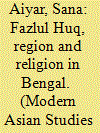|
|
|
Sort Order |
|
|
|
Items / Page
|
|
|
|
|
|
|
| Srl | Item |
| 1 |
ID:
087784


|
|
|
|
|
| Publication |
2008.
|
| Summary/Abstract |
In the wake of the Government of India Act of 1935, provincial politics emerged as a challenge to the authority and legitimacy of all-India, centralised political parties. While the Congress and the Muslim League set up a binary opposition between secular and religious nationalism, provincial politicians refused to succumb to the singularity of either alternative. Partition historiography has been concerned with the interplay of national and communal ideologies in the 1940s, overshadowing this third trajectory of regional politics that was informed by provincial particularities. This article traces a short-lived alternative that emerged in Bengal between 1940 and 1943 under the premiership of Fazlul Huq. Huq produced a peculiar form of identity politics that appealed not only to religious sentiment but also to regional loyalty that cut across the religious divide. Significantly, he did so without resorting to secular claims. By challenging Jinnah's claim to being the sole spokesman of Muslims in India and highlighting the different concerns of a province with a Muslim majority, Huq reconciled the twin identities of religion and region within the same political paradigm, and foreshadowed the emergence of Bangladesh in 1971.
|
|
|
|
|
|
|
|
|
|
|
|
|
|
|
|
| 2 |
ID:
191125


|
|
|
|
|
| Summary/Abstract |
Burma, or Myanmar as it was renamed in 1989, is largely ignored within the discipline of South Asian Studies, despite its cultural, religious, economic, and strategic significance for the wider worlds of Asia. Burma is often studied either in isolation or alongside Southeast Asian countries such as Thailand, Vietnam, and Malaysia, despite its equally important historical and cultural connections to communities, states, and networks across what is now India, Bangladesh, Sri Lanka, or Nepal. In this Roundtable, four scholars of South Asia discuss Burma's erasure within the discipline, the origins and limitations of traditional area studies frameworks, and the possibilities afforded by Burma's inclusion within a more expansive conception of South Asia.
|
|
|
|
|
|
|
|
|
|
|
|
|
|
|
|
|
|
|
|
|